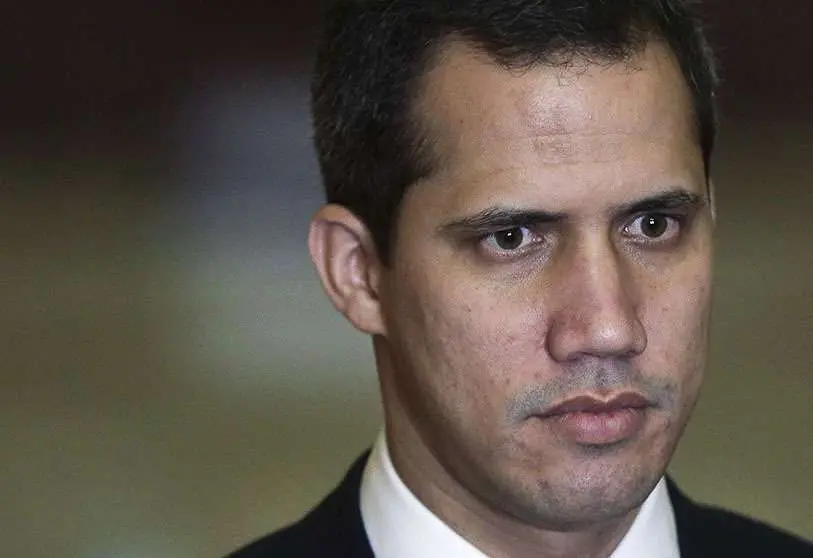Juan Guaidó: "We are not prepared to live with a dictatorship"

This past Monday, Juan Guaidó, a strong man in the Venezuelan opposition, presented the "Unitary Pact for Freedom and Free Elections" in which 37 parties and 105 civil society organizations participate. With this pact, the elected president of the National Assembly (NA) intends to renew the Assembly.
The main dissent among the opposition is whether or not to participate in the elections called by Nicolas Maduro for December 6.
Part of the opposition - personified in former presidential candidate Henrique Capriles - has shown itself willing to participate in the call to the polls. Guaidó and his supporters have rejected this initiative, which they describe as a "fraudulent process".
Juan Guaidó spoke about this and other issues, such as relations between Venezuela and the European Union and the Chavista regime with Iran, at the event organised by the New Economy Forum. With the participation of Ramón Jáuregui, former minister with Jose Luis Rodríguez Zapatero, MEP and President of the Euroamerica Foundation, Antonio López-Istúriz, Secretary General of the European People's Party and other personalities, the Venezuelan politician has assured that "I will remain in Venezuela", whatever happens.
"All the political parties are focused on fighting to end the Chavista dictatorship. We are not going to recognise fraud because we have no conditions, on the contrary, we are going to fight to achieve conditions and turn the vote into democracy and a legitimate struggle," said Guaidó.
The division among the opponents of the Maduro regime was revealed when Capriles, who has been banned from holding public office since 2017, stepped down from Maduro's line.
On the conditions of the elections, the European Union "has to play a central role," Jáuregui said. "Venezuela is experiencing an absolute lack of freedom, and it is precisely this lack of freedom that gives rise to a set of efforts to support those who have won the elections in 2015".
For the former Member of the European Parliament, in order to hold free elections there must be "a regulated census, an agreement to control the electoral council, freedom for all political leaders and parties, and freedom for all political prisoners".
The European Union must play a leading role in Venezuela's transition to democracy, since "the impact of the Venezuelan crisis on Latin America is significant: the links with the ELN, the gold trade, the plundering of the Amazon... In addition to the need for a health emergency, which has multiplied with the pandemic, it is vital for Europe to intervene," Guaidó said.

The great role of Europe is to determine what those minimums are in order to turn this process into a solution, so that the dictatorship cannot use them," the president of the NA denounced.The Venezuelan opposition leader insisted on denouncing to the EU the "unacceptable conditions" of the parliamentary elections on 6 December, in which 27 opposition parties have said they will not stand.
We are not prepared to live with a dictatorship," said Guaidó, who has called on the Venezuelan people to hold a referendum in October.
The Secretary General of the European People's Party, Antonio López Instruiz, also showed his support for the Venezuelan opposition: "You have the support of the EPP, which is not going to be fooled by the propaganda being generated for the forthcoming elections," said Instruiz.
Instruiz took the opportunity to criticise the statements made by the Spanish Minister of Foreign Affairs, Arancha González Laya, who said she would support the elections in Venezuela "if there is a space for them to be held with guarantees".
Asked about the financing of this consultation, the opposition leader said that, given the impossibility of using Venezuelan funds, "which are protected to be used for the transition to democracy, we have international and private sector support to mobilise the majority in Venezuela".
International alliances and ties with countries like Iran and Cuba have been another of the issues addressed by Guado, who said the Caracas-Tehran tandem is "quite delicate," with Maduro's government paying with gold for the oil that Iran imports into the country with the world's largest oil reserves.
For its part, the Cuba-Venezuela relationship continues to maintain the exchanges of intelligence and counter-intelligence that the Castro regime has been conducting in Caracas for years.
The forthcoming US elections are also of interest to Caracas, as there is still a doubt as to whether a new administration led by the Democrat Joe Biden will continue with the sanctions Trump imposed on the Chavista regime. "The United States' backing is for the Venezuelan Parliament, not a name. Maduro's problem is not just with the White House. We have relations with the Democrats," Guaidó explained, and recalled the crimes of which Nicolas Maduro is accused in the United States: drug trafficking, terrorism, corruption and other criminal charges.
.










